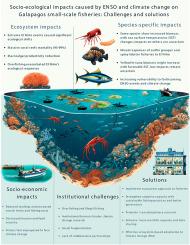厄尔尼诺-南方涛动和气候变化对加拉帕戈斯小型渔业的社会生态影响概述
IF 5.4
2区 环境科学与生态学
Q1 OCEANOGRAPHY
引用次数: 0
摘要
加拉帕戈斯海洋保护区的小型渔业面临着气候异常以及治理不力和过度捕捞等人为因素造成的巨大挑战。本综述探讨了厄尔尼诺-南方涛动(ENSO)和气候变化对加拉帕戈斯小型渔业的社会生态影响,包括厄尔尼诺-南方涛动和气候变化研究在这个多用途海洋保护区的进展和挑战。1982/83年、1997/98年和2015/16年的极端厄尔尼诺现象造成了显著的生态变化和渔业生产力波动。虽然一些物种的生物量有所增加,这可能与海面温度变化和生态系统动态变化有关,但对其他物种的影响仍不确定或未得到充分探索。帆鳍石斑鱼(Mycteroperca olfax)和刺龙虾(Panulirus penicillatus 和 P. gracilis)渔业对厄尔尼诺现象的反应不一,说明厄尔尼诺/南方涛动对生态的影响十分复杂,过度捕捞进一步加剧了这种影响。对捕鱼社区的社会经济影响包括上岸量减少、搜寻时间延长、捕鱼成本增加以及生计更无保障。对未来的预测表明,厄尔尼诺/南方涛动和气候变化的影响越来越大,这强调了采用生态系统方法来处理渔业问题的必要性。主要战略包括提高适应能力、推广可持续做法以及采用社会生态和跨学科研究方法。然而,治理薄弱阻碍了厄尔尼诺/南方涛动和气候变化研究的进展,其特点是体制障碍阻碍了坚实的渔业治理政策的制定和执行。为了加强加拉帕戈斯小型渔业的恢复能力,必须在国际合作和战略投资的支持下开展机构间和部门间合作,以增强当地的研究能力。本文章由计算机程序翻译,如有差异,请以英文原文为准。

An overview of social-ecological impacts of the El Niño-Southern Oscillation and climate change on Galapagos small-scale fisheries
Small-scale fisheries in the Galapagos Marine Reserve face significant challenges due to climatic anomalies and human-induced changes such as weak governance and overfishing. This overview explores the social-ecological impacts of the El Niño-Southern Oscillation (ENSO) and climate change on Galapagos small-scale fisheries, including the progress and challenges of ENSO and climate change research in this multiple-use marine protected area. The extreme El Niño events of 1982/83, 1997/98, and 2015/16 caused significant ecological shifts and fluctuations in fisheries productivity. While some species have shown increases in biomass, likely linked to sea surface temperature changes and altered ecosystem dynamics, the impacts on others remain uncertain or underexplored. Sailfin grouper (Mycteroperca olfax) and spiny lobster (Panulirus penicillatus and P. gracilis) fisheries have exhibited mixed responses to the El Niño, illustrating the complex nature of ENSO's ecological effects, which are further exacerbated by overfishing. The socio-economic impacts on fishing communities include reduced landings, longer search times, higher fishing costs, and increased livelihood insecurity. Future projections suggest an increasing vulnerability to ENSO and climate change, emphasizing the need for an ecosystem approach to fisheries. Key strategies include enhancing adaptive capacity, promoting sustainable practices, and adopting a social-ecological and transdisciplinary research approach. However, progress in ENSO and climate change research is hampered by weak governance, characterized by institutional barriers that hinder the formulation and enforcement of solid fisheries governance policies. To strengthen the resilience of Galapagos small-scale fisheries, interinstitutional and intersectoral collaboration is essential, supported by international cooperation and strategic investments to bolster local research capabilities.
求助全文
通过发布文献求助,成功后即可免费获取论文全文。
去求助
来源期刊

Ocean & Coastal Management
环境科学-海洋学
CiteScore
8.50
自引率
15.20%
发文量
321
审稿时长
60 days
期刊介绍:
Ocean & Coastal Management is the leading international journal dedicated to the study of all aspects of ocean and coastal management from the global to local levels.
We publish rigorously peer-reviewed manuscripts from all disciplines, and inter-/trans-disciplinary and co-designed research, but all submissions must make clear the relevance to management and/or governance issues relevant to the sustainable development and conservation of oceans and coasts.
Comparative studies (from sub-national to trans-national cases, and other management / policy arenas) are encouraged, as are studies that critically assess current management practices and governance approaches. Submissions involving robust analysis, development of theory, and improvement of management practice are especially welcome.
 求助内容:
求助内容: 应助结果提醒方式:
应助结果提醒方式:


